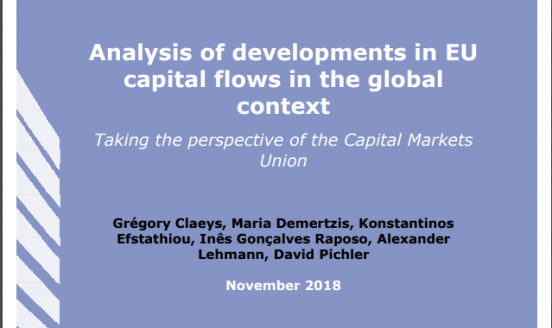An update: sovereign bond holdings in the euro area – the impact of quantitative easing
Since the European Central Bank’s announcement in January 2015 of its quantitative easing programme, national central banks have been buying governmen

Download the sovereign bond holdings dataset
This post updates a calculation published in May 2016
By the end of September 2017, the European System of Central Banks had purchased €1,784 billion of bonds under its public sector purchase programme (PSPP), of which €193 billion (11 percent) was supranational bonds and €1592 billion (the remaining 89percent) was national government and agency bonds. Purchases of asset-backed securities reached €24 billion by the end of February, while holdings under the third covered bond purchase programme (CBPP3) amounted to €237 billion (see here for breakdowns). Starting in June 2016, the ECB also added a corporate sector purchase programme (CSPP), which now stands at €116 billion.
Figure 1 shows the deceleration in monthly asset purchases since April 2017, which is due to the reduction in the ECB’s target from €80 billion to €60 billion. The ECB has communicated to keep this target at least until December of this year.
The monthly purchases are split between the ECB and the national central banks (NCBs). The NCBs’ balance sheets have increased almost fivefold since the start of the expanded asset purchase programme (APP), as shown by Figure 2.
The data also allows us to analyse how central bank purchases are being offset by other institutional sectors in the countries in question. This is of interest because banks’ holdings of domestic government debt surged during the crisis, leaving national banking systems more vulnerable to domestic shocks. This is especially true for Spain, Italy and France, where the banking sector holdings of sovereign bonds approximately doubled at the peak of financial turmoil compared to pre-crisis levels. This development is even more extreme for Portuguese banks, which owned only about 4 percent of sovereign bonds in 2007, but 24 percent in 2012.
Table 1 shows the percentage point change in institutional holdings of domestic sovereign bonds between Q4 2014 and Q1 2017. Our updated figures highlight that the central bank purchases in Spain have been offset mainly by decreases in resident banks’ holdings, leading to a decreased sovereign-bond dependency. Starting from more than 30 percent in Q4 2014, Spain managed to reduce the share of sovereign bonds to about 20 percent of total public debt.
For the other countries in Table 1, it seems that QE operations reduced the holdings of resident banks only to a limited extent (about 2 percent). In Portugal and the Netherlands, for example, bond purchases by national central banks have been almost completely offset by a decrease in non-resident holdings. This is in contrast to Italy where other residents, such as households and companies, reduced their sovereign bond exposure most.
With QE in operation at least until the end of 2017, our conclusion from this update is very much in line with our previous blog post: we see that sovereign bonds purchased by national central banks were sold mainly by institutional sectors other than resident banks, with the exception of Spain.



